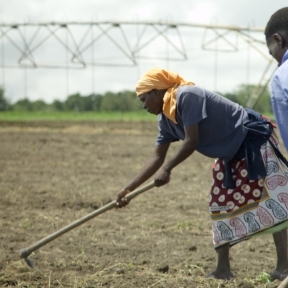World Water Day 2015: water for sustainable development

World Water Day is held annually on 22 March to focus attention on the importance of freshwater and sustainable management of water resources. In 2015, the World Water Day theme is 'Water & Sustainable Development'. From food and energy security to human and environmental health, water contributes to improvements in social well-being and inclusive growth. Today, WWAP launches the World Water Development Report: 'Water for a sustainable world'.
Sustainable development at UNESCO-IHE
This years World Water Day theme is closely connected to our work in the international water community. Please find some examples of what we do at UNESCO-IHE listed here, categorized per World Water Day topic.
Water is Health
Despite impressive gains made over the last decade, 748 million people do not have access to an improved source of drinking water and 2.5 billion do not use an improved sanitation facility (source: unwater.org). UNESCO-IHE works on solutions to address this problem with the development of the eSOS toilet. In addition, research and projects in collaboration with partners are excecuted on a continous basis. Read more on our research theme safe drinking water & sanitation and our Water supply, Sanitation and Hygiene initiative.
Water is Nature
ecosystems – including, for example, forests, wetlands and grassland – lie at the heart of the global water cycle. All freshwater ultimately depends on the continued healthy functioning of ecosystems, and recognizing the water cycle is essential to achieving sustainable water management (source: unwater.org). UNESCO-IHE actively works on improving the quality of ecosystems and livelihoods by focussing on ecological and hydrological processes within natural wetlands and rivers, as well as large scale catchment management, interaction with livelihoods and links with water governance. Read more about our research on water and ecosystems quality or watch the video of Prof. Ken Irvine on this topic.
Water is Urbanization
The world's cities are growing at an exceptional rate. 93% of the urbanization occurs in poor or developing countries, and nearly 40% of the world's urban expansion is growing slums (source: unwater.org). UNESCO-IHE is working on creating liveable cities and improving the urban environment in Asian cities. Read the story here. In our educational programmes, we also focus on the consequences of urbanization for the water cycle. Together with the Asian Institute of Techology we offer a MSc programme on Urban Water Engineering and Management.
Water is Industry
Some industries are more water-intense than others. Technology and smart planning reduce the use of water, and can improve the quality of wastewater (source: unwater.org). The IHE-Adart arsenic removal technology is based on arsenic adsorption by low cost media, a by-product from the drinking water industry, and a patented in situ regeneration procedure. Branislav Petrusevski, Associate Professor of Water Supply Engineering at UNESCO-IHE has developed this technology for the drinking water industry in developing countries.
Water is Energy
Renewable energy comes from resources which are naturally replenished such as sunlight, wind, rain, tides, waves and geothermal heat. These do not require large quantities of fresh water. Yet at today’s rate of adoption, renewable energy will remain marginal at the global scale (source: unwater.org). At UNESCO-IHE we actively work on promoting renewable energy solutions, for example with our work on reallocating water between hydropower and the environment in the Zambesi Basin.
Water is Food
The current growth rates of agricultural demands on the world’s freshwater resources are unsustainable. Inefficient use of water for crop production depletes aquifers, reduces river flows, degrades wildlife habitats, and has caused salinization of 20% of the global irrigated land area. To increase efficiency in the use of water, agriculture can reduce water losses and, most importantly, increase crop productivity with respect to water (source: unwater.org). Read more on UNESCO-IHE's research on reducing food insecurity.
Water is Equality
In developing nations the responsibility for collecting water every day falls disproportionately on women and girls. On average women in these regions spend 25 percent of their day collecting water for their families. Climate change negatively impacts fresh water sources. Combined with increased demands for water, this will create huge challenges for water resources management. (source: unwater.org). UNESCO-IHE advocates gender equality and provides solutions for integrated water resources managment.
More on UNESCO-IHE's innovations for sustainable development
WWDR 2015: water for a sustainable world
The World Water Development Report 2015 demonstrates how water resources and services are essential to achieving global sustainability. Taking account of economic growth, social equity and environmental sustainability, the report’s forward-looking narrative describes how major challenges and change factors in the modern world will affect – and can be affected by – water resources, services and related benefits.
"Sustainable development of water resources require in-depths system understanding and capacity building. Without sufficient local capacity, any investment and its sustainability is at stake," says Professor Stefan Uhlenbrook, Vice-Rector of UNESCO-IHE.
Read more about our capacity development activities.
The report provides a comprehensive overview of major and emerging trends from around the world, with examples of how some of the trend-related challenges have been addressed, their implications for policy-makers, and further actions that can be taken by stakeholders and the international community.
Download the World Water Development Report here
World Water Day conference at UNESCO-IHE
On 12 March, UNESCO-IHE organized a joint World Water Day and International Womens Day conference on 'Women and Water Make Sustainable Food Security Happen'. Read more here about the event.

